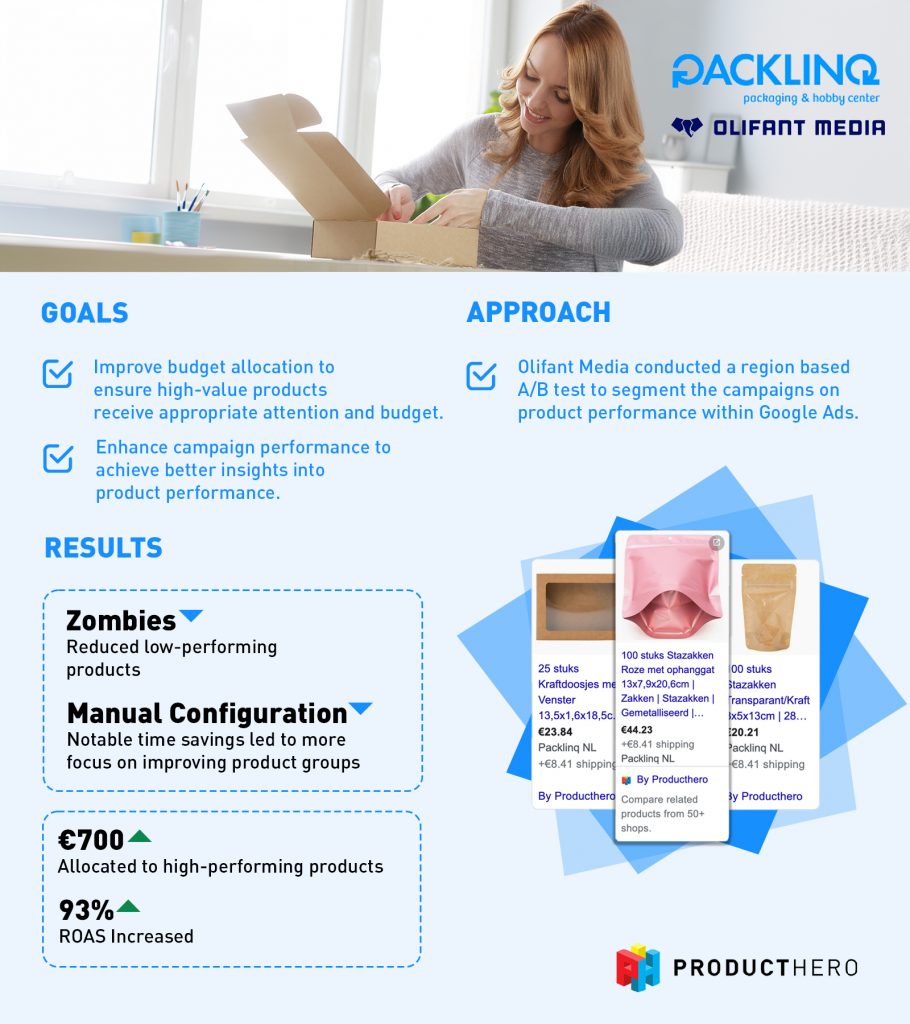Case study: Packlinq conducted an A/B test with the Labelizer Strategy
About Packlinq
- Multichannel production and distribution of packaging, hobby products, decoration materials, and disposables.
- Founded in 2009.
- Headquarters in Sassenheim (The Netherlands).
- Website: www.packlinq.nl
About Olifant Media
- The online marketing agency for impactful campaigns.
- Focus on organizations aiming to improve the world.
- Headquarters in Leiden (The Netherlands).
- Website: www.olifantmedia.nl
About Producthero
- Comparison Shopping Service (CSS Google Partner)
- Software vendor for Shopping Ad tools
- Headquarters in Amsterdam (The Netherlands)
- Website: www.producthero.com
Challenge: Wide range of products – Impact on Google Ads
Packlinq is renowned for developing, producing, selling, and distributing eco-friendly packaging materials, decorations, and hobby products, focusing on biodegradable plastic under the brand Ecolinq. The organization faced challenges with their Google Ads campaigns due to the complexity of managing over 20,000 products.
Some campaigns led to unnecessary expenditures, particularly on hobby products, while other high-value items received insufficient attention. As a result, Packlinq’s founders enlisted the help of Olifant Media, a digital marketing agency experienced in helping organizations grow through strategic digital marketing solutions.
Olifant Media’s approach
Rowan Jacobs, an experienced SEA specialist, led the optimization efforts for Google Ads. He proposed a four-month A/B test to segment the campaigns based on product performance within Google Ads, focusing on two regions: North Holland and South Holland. These regions were chosen because they had an equal distribution of site visitors and conversions.
For one region, the classic approach of setting up ad campaigns based on product categories (resulting in numerous campaigns) was used. In contrast, the other region employed Producthero’s Labelizer Strategy, which divided products into four campaign groups:
- Heroes: products with high conversions and volume
- Sidekicks: products with high conversions but lower volume
- Villains: products with low conversions but high clicks, thus costly
- Zombies: products with low conversions and low volume
This approach provided better insights into product performance, automatically excluded certain products, and allowed the SEA specialist to focus more on analyzing and improving product groups.
Positive test results
The classic method did not always use the budget effectively, often allocating more funds to non-converting products. Additionally, many products were not displayed in Google ads (Zombies).
The test period showed positive results, with an overall ROAS increase of 93% for the Labelizer campaigns. The Labelizer campaigns spent more budget (700 euros) as the Heroes products received more attention. Furthermore, there was a time-saving in manual configurations, allowing for other optimizations.

Following these positive results, Rowan Jacobs decided to apply further optimizations to the strategy.
Further product segmentation
Given the large number of products, Rowan Jacobs of Olifant Media decided to extend the Producthero Labelizer strategy. Beyond expanding it to all regions, he analyzed and split the product groups into two categories based on profit margin: high and low. This resulted in four categories per product group, further refining budget allocation and reducing the number of Zombie products (e.g., Heroes with high and low profit margins).
Collaboration and trust
Olifant Media worked closely with Packlinq to align goals and clearly present results. A strong bond of trust developed through a focus on innovation, explaining tests in advance, and transparently sharing both challenges and positive outcomes.
Automating actions for greater focus on strategy
Thanks to Olifant Media’s strategic efforts, led by the expertise of SEA specialist Rowan Jacobs, Packlinq significantly improved their Google Ads results with a ROAS increase of 93%. The implementation of Labelizer and the focus on specific product groups led to higher efficiency and profitability, enabling Packlinq to achieve its digital marketing goals.
Role of the SEA Specialist
Rowan Jacobs, with extensive experience as a senior SEA specialist, brought not only technical expertise but also a strategic approach. By leveraging data analysis and reducing manual tasks, such as automatically excluding non-performing products, it was possible to utilize the marketing budget more efficiently.

